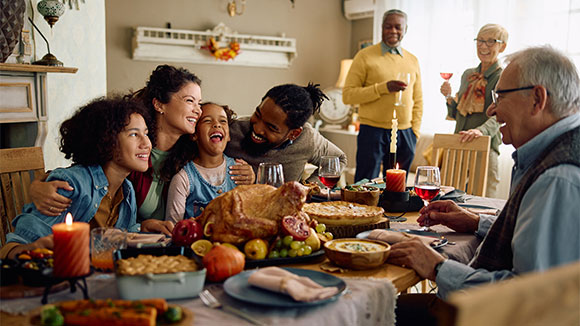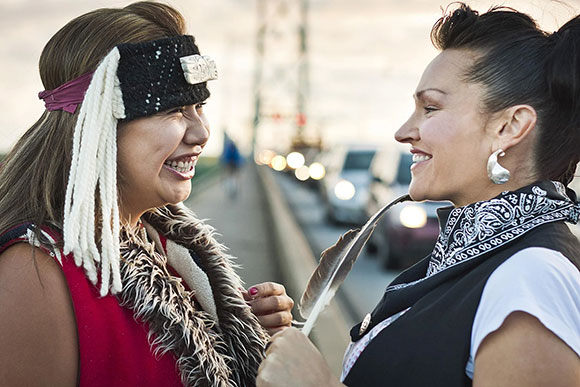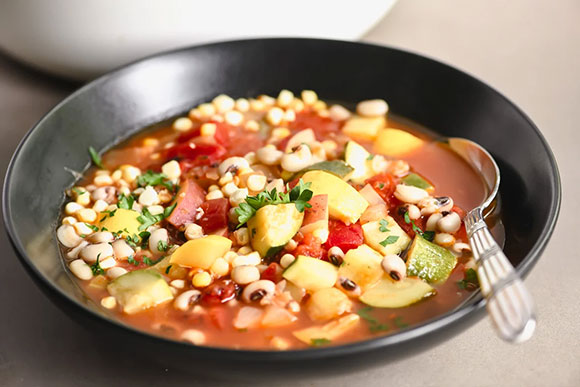Thousands, perhaps even millions of people have grown up celebrating Thanksgiving under a particular narrative that in recent years has been debunked and proven problematic. So, the question is – do we have to suddenly drop a lifelong tradition? Or are there ways to shift and adjust our traditions to still celebrate, but celebrate respectfully? Here are some ideas on how to do just that.

Shutterstock
Within recent years, many of us have now become familiar with the fact that while we grew up being told a wistful and whimsical story of pilgrims and Native Americans coming together for a bountiful and friendly feast signifying the origins of Thanksgiving, we were, in fact, being fed a false narrative fueled by ignorant (or arrogant, depending on your views) colonization. The truth of the matter is that Thanksgiving has actually become one of the most convoluted, controversial, and challenging holidays we have in the United States.
On one hand, we have a holiday that nearly every American has grown up celebrating in some form or another and many of us have developed some pretty deep-rooted family traditions in doing so. On the other hand, we also have Native American Heritage Month (Native American Heritage Day, in particular, being the day after Thanksgiving - Friday, November 25th) and its goal to bring to light the hundreds of years of oppression, racism, and genocide that simply can't (shouldn't) go unnoticed, overlooked, or trivialized any longer. So how can one continue to celebrate what, for many, has become a cherished holiday while still showing respect for and acknowledging the plight of an entire people? Well, here are a few suggestions to get started on the right path.
Explore Culture with an Anthropology Degree @ Coastline
Familiarize yourself with the real history.
"The Real History of Thanksgiving" or "Myths About Thanksgiving" narratives continue to emerge each year. Read them, watch them, and share them with your friends and family to educate and bring attention to the challenges and tragedies the Wampanoag tribe actually experienced.
After learning the history, learn the current issues.
Cultural Survival puts it best, in that “It is important to set the record straight, acknowledge Native Peoples, debunk myths, and show Native Americans as contemporary people with dynamic thriving cultures.” It’s baffling that it needs said, but some people even need the reminder that Indigenous people aren’t just this entity that existed in history that we need to learn about and acknowledge – they are a living, breathing, thriving, rich culture of people whose accomplishments need celebrated, voices need heard, and needs and struggles need addressed. So after familiarizing yourself with the history, research some of the (numerous) issues and challenges Native people are facing today.

Photo from "Concrete Indians" Series by Nadya Kwandibens
Be an ally to Native American people and take action.
It's one thing to acknowledge and learn about the history and heritage of a people, but it's an empty gesture if it stops there and doesn't translate to supporting the current and future generations. As mentioned above, educate yourself about current tribal issues. Learn about and experience the culture by attending an Indigenous event. Support Native American businesses and shop native. Make a conscious effort to avoid microaggressions and cases of cultural appropriation in your daily life (and speak up against them as much as you can). Support Indigenous organizations by either donating or volunteering. Doing what you can where you can, no matter how small, is still one more drop of support in a bucket that has been tragically dry for hundreds of years.
Change up the holiday menu to showcase native recipes.
While it may be difficult to say goodbye to the customary and traditional turkey feast, changing up even just a couple of side dishes to showcase native foods not only would acknowledge native culture but would also be an excellent talking point, and may even end up a possible gateway to discovering more about native foods and decolonization diets. In an interview with Vice News, chef Nephi Craig, a half-Navajo member of the White Mountain Apache tribe of Whiteriver, Arizona, recommends starting with the signature dish known as Three Sisters – corn, beans, and squash. Craig says, “Don't worry about the recipe. It doesn't have to be fancy. Just remember equal parts corn, beans, and squash… This is the gateway dish to decolonizing your diet and it will add the history of Native Americans to any Thanksgiving spread.”

"Three Sisters Stew" - photo & recipe from The View from Great Island
Take the "Thanksgiving" out of "Thanksgiving."
There's no law that says this holiday has to acknowledge the narrative we've been fed growing up. Take the holiday and make it your own by changing the narrative and instead have it simply be a day of thanks. It can be a day to simply acknowledge all you're thankful for. It can be a day of family, friends, and food. Or focus on the second half of the word and make it a day of giving - an annual day of volunteering or doing activities that help out loved ones.
For more ideas on how to respectfully celebrate Thanksgiving, check out Cultural Survival's 8 Ways to Decolonize and Honor Native Peoples on Thanksgiving or any of the other resources linked below. Whether you decide to completely overhaul your holiday or start small with just one or two changes, the important things to remember about this holiday are showing respect for all peoples and expressing gratitude for all we are blessed with. That said, in whatever way you may be celebrating, I truly hope you have a warm, safe, and happy holiday!
Resources & Further Reading